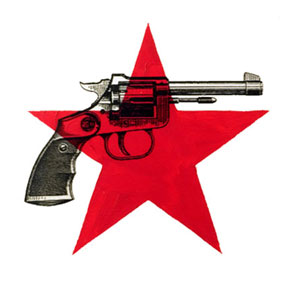



.webp)
Gianni Politi - ...And you tool me
"and you use me," is the ironic response to the slogan "I tool U," with which to March 2009 the very young artist Gianni Politi had introduced himself to the public, in his first solo show for the CO2 contemporary art gallery. From the elaboration of the romantic "I love you," to an acerbic utilitarian translation, less love and more pragmatism. Intriguing and provocative, intentionally ambiguous and transversal, Politi centers (or perhaps centers) his work in the empty infinite space of intel paper, where the violence of a gestural stroke to graphite conceals and reveals nothing but pure tools from work. Familiar objects that transform without transforming, simple manual devices that act on our emotional mechanisms in complex and detonating ways.
The research moves from the desire to portray, ennobled in new totemic semblances, everyday objects, banal tools from work for that matter, a realistic representation that by virtue of spatial dilation becomes creation and at the same time destruction, sense and counter-sense in a single evocative form. Says Gianluca Marziani, "Iconic apparitions are transformed into alien objects with plausible features. Recalling Konrad Klapheck's surrealist short-circuit, Politi investigates the seething metaphysics of static form, unearthing the inner fire of archetypes from manual labor. The gaze on his paraphernalia forces us to take private action on the mechanisms of judgment and prejudice, on the systems that regulate our moral volume."
Huge graphites on intel paper and fuselages on from dusting paper, two among the techniques employed to synthesize the strength of his vertical marks, gradually almost automatic: geometric and deep cuts investigate beyond the surface, ranging into three-dimensionality, bringing the hardness of the action to be a means to grasp the pleasantness of visual perception. What is most striking is the ability to transform the two-dimensionality of drawing on paper into a kind of three-dimensional sculpture: where what is usually thin and light, like a graphite line, reappears solid, heavy, dirty. In each opera the tracks of strong physical contact remains imprinted. The viewer will see a microcosm of recognizable objects that mutate into something macroscopic and imposing, so from make a harmless scissors more cruel and frightening than a grenade.
In Politi's imagination the "tools from work" regardless of the type of their primary use, so even war offers its workers/soldiers a worthy "paraphernalia" of Tools. For the occasion, the author will create a site-specific installation project, joining the sweet and bitter of a war fetish in an unusual combination.
Gianni Politi
Born to Rome in 1986, he has worked at the studio of well-known Roman artists, such as Gianluigi Mattia, Piero Pizzi Cannella.
While studying philosophy, he discovered his deep aesthetic interest in modernity, analyzed and dissected through the use of multiple artistic media.
In the series "Tools," the artist begins his research on the inorganic icons of the contemporary, both aesthetically and politically, through the representation and deflagration of the tools that are used every day to defend the "status quo" of the Western economy. The objects are chosen from the deadliest weapons used by Western armies but also from the tools Politi employs in his work. This juxtaposition expresses both a fascination with materials and a metaphor for work as a means of survival against the destructive power of weapons and aggressive politics. The two types of tools are used to achieve the same end: the benefit of those who use them. One, however, moral and harmless, the other violent and disrespectful. In the "Red Flags" series, on the other hand, he plays ambiguously with the communist-style terrorism of past decades, which underlies modern-day Western organic thinking.
The artist lives and works between Rome and Milan.
Street ofFonte Secca.
from Saturday, July 4 to Sunday, July 12Hours: Mon-Fri 17-20 and Sat-Sun 17-21
solo exhibition of
GIANNI POLITI
to curated by Gianluca Marziani and
Maria Letizia Bixio


